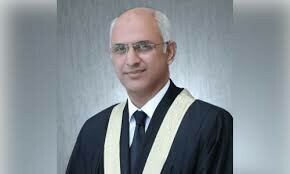PESHAWAR, Feb 9: Worshippers were saying prayer in a village mosque when a suicide bomber struck. Former interior minister Aftab Khan Sherpao survived the attack, the second aimed at him in eight months, but 53 people around him died in a hail of shrapnel.
A wave of militant attacks on both senior opposition and government figures is casting a long shadow over the general election, especially in the volatile northwest, where candidates like Sherpao have been reduced to campaigning behind closed doors.
“They want to create terror, and what could be a more conducive situation than the elections where rallies and gatherings are held,” he told The Associated Press during an interview in a shuttered room at his heavily guarded home in Peshawar.
“Even if the elections are held, the turnout is going to be low. It will cast doubt on the credibility of the results,” said Sherpao, who as interior minister helped lead the government’s fight with extremists.
The Feb 18 elections were meant to usher in a new democratic era after eight years of military rule under President Pervez Musharraf, an increasingly unpopular leader who gave up his dual post as military commander two months ago to govern as a civilian.
Instead, the ballot is being held against a backdrop of fear and apathy, particularly in the North West Frontier Province, where the authority of Musharraf’s US-backed government is weak and militants with ties to the Taliban and Al Qaeda threaten its control.
Posters of rival parties festoon the traffic-choked streets of Peshawar, but the raucous campaign rallies that usually accompany the elections are nowhere to be found, especially since the Dec 27 assassination of opposition leader Benazir Bhutto.
Her slaying, six days after the attack on Sherpao, sparked violent demonstrations across the country and forced a six-week postponement in the elections as fears deepened in the campaign.
Despite a cease-fire called by militants in recent days that has brought a lull in bloody clashes between Taliban fighters and security forces in the borderland, politicians are still reluctant to take to the streets to stump for votes.
Nervous candidates hold only small gatherings of party workers and influential people inside homes or high-walled compounds, sending them off to use informal social connections to encourage support from voters.
Even leaders of religious parties sympathetic to the Taliban are keeping a low profile, although their candidates get help from dozens of affiliated mosques and religious schools whose clerics endorse Islamic policies and let the parties hold events in their compounds.
The NWFP has 24 districts, and the government has declared only six of them “normal” for the election — meaning they don’t need additional policing to protect voters. In all, authorities plan to deploy 57,000 police and soldiers for the election in the province.
“My wife tells me not to go, but we have to” attend campaign meetings, said Ghulam Ahmed Bilour, a wealthy industrialist who is a candidate for the Awami National Party.
Bilour and other veteran politicians are relying on a web of connections to drum up votes in the areas where their families wield influence. They are also making regular appearances on burgeoning television channels.
Sherpao, who leads a breakaway faction of Ms Bhutto’s party and threw in his lot with Musharraf after the last election in 2002, said he has assembled small groups in his spacious homes and those of party colleagues rather than in public places.
“I can’t really go announced to a place, so I just have to go unannounced and keep changing my routes,” he said. “With my movements restricted, naturally I’m not helping (my party’s candidates) as I should.”
The popular mood is as drab as the campaigning.
Mohammed Zahid, a 35-year-old shopkeeper who sells shoes about 150 meters (yards) from Peshawar’s most recent suicide bombing, said he will not vote because he doesn’t believe any of the parties can bring a turn for the better — and because he fears there will be violence on election day.
“When we leave our homes in the morning we are not sure that we will return safely,” Zahid said, sitting idly while hoping for a return of customers who he said have become scarce for fear of attacks.
“The (military) operations must stop, Musharraf has to go and there should be negotiations with the Taliban,” he said.
The fear and mistrust bode ill for the kind of political consensus that many say is vital if the Pakistani state is to survive.
In the last elections, in 2002, religious parties led by the Jamiat Ulema-i-Islam-F movement won control of the provincial government on a wave of disaffection over the US invasion of Afghanistan. They also won unprecedented influence in the National Assembly and in the Senate as Musharraf marginalised mainstream parties to safeguard his own grip on power.
But the MMA-led provincial administration collapsed last year, and widespread dissatisfaction with their performance in office makes it unlikely they will win back control.
Yet with little indication the election will produce a clear and credible result, the next national government could be weaker — a vacuum the Taliban could exploit.
“They punish killers, thieves,” Arbab Alamgir Khan, a candidate for Ms Bhutto’s Pakistan People’s Party, said of the militants. “So people say these people are better than the government, and I think this is very dangerous for the government.”—AP














































Dear visitor, the comments section is undergoing an overhaul and will return soon.